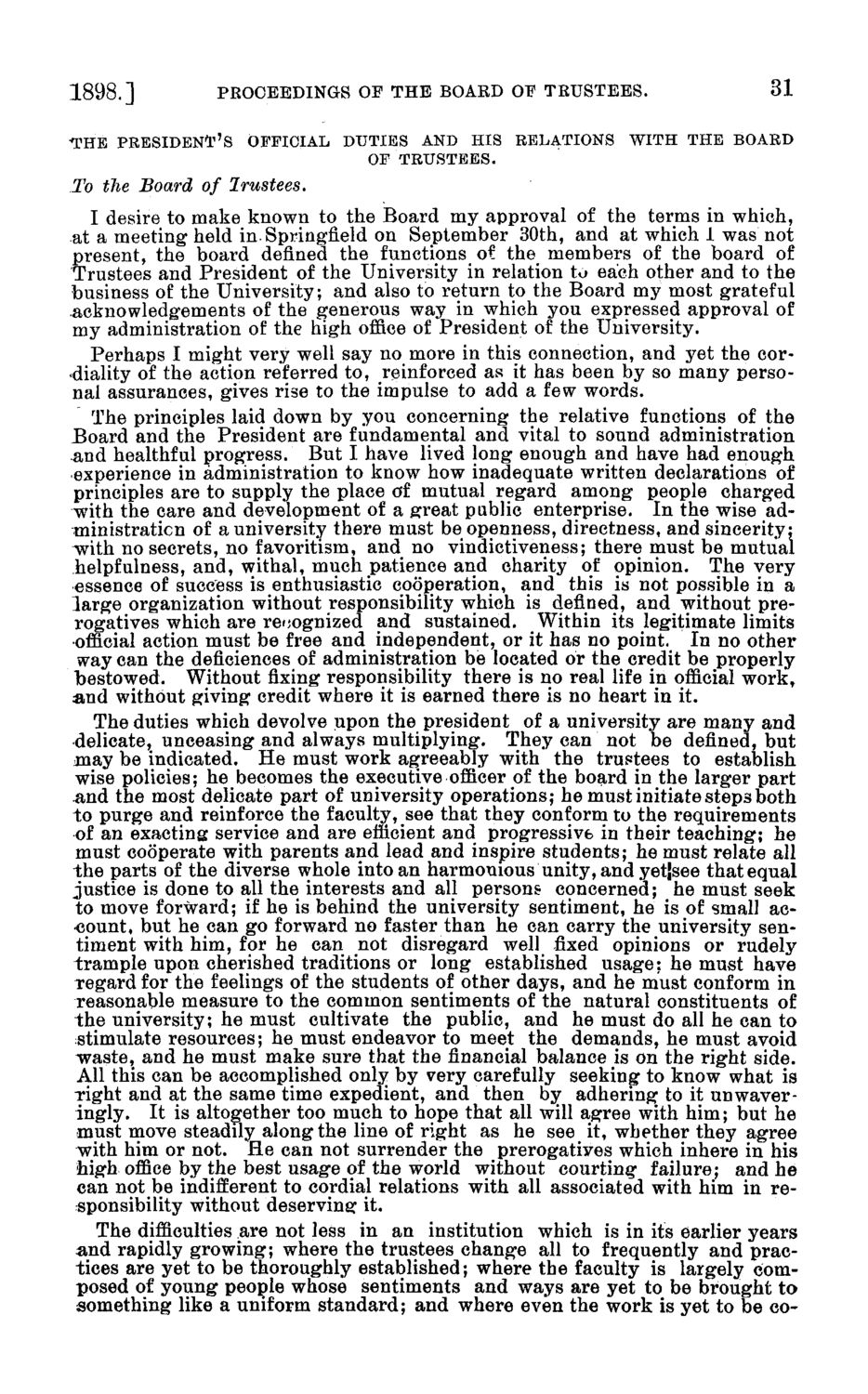| |
| |
Caption: Board of Trustees Minutes - 1900
This is a reduced-resolution page image for fast online browsing.

EXTRACTED TEXT FROM PAGE:
1898.] PROCEEDINGS OF THE BOARD OF TRUSTEES. OFFICIAL DUTIES AND HIS RELATIONS OF TRUSTEES. 31 T H E PRESIDENT'S WITH THE BOARD To the Board of Trustees. I desire to make known to the Board my approval of the terms in which, at a meeting held in. Springfield on September 30th, and at which 1 was not present, the board defined the functions of the members of the board of Trustees and President of the University in relation to each other and to the business of the University; and also to return to the Board my most grateful acknowledgements of the generous way in which you expressed approval of my administration of the high office of President of the University. Perhaps I might very well say no more in this connection, and yet the cordiality of the action referred to, reinforced as it has been by so many personal assurances, gives rise to the impulse to add a few words. The principles laid down by you concerning the relative functions of the Board and the President are fundamental and vital to sound administration -and healthful progress. But I have lived long enough and have had enough experience in administration to know how inadequate written declarations of principles are to supply the place of mutual regard among people charged with the care and development of a great public enterprise. In the wise administration of a university there must be openness, directness, and sincerity; with no secrets, no favoritism, and no vindictiveness; there must be mutual helpfulness, and, withal, much patience and charity of opinion. The very essence of success is enthusiastic cooperation, and this is not possible in a large organization without responsibility which is defined, and without prerogatives which are recognized and sustained. Within its legitimate limits official action must be free and independent, or it has no point. In no other way can the deficiences of administration be located or the credit be properly bestowed. Without fixing responsibility there is no real life in official work, «,nd without giving credit where it is earned there is no heart in it. The duties which devolve upon the president of a university are many and delicate, unceasing and always multiplying. They can not be defined, but may be indicated. He must work agreeably with the trustees to establish wise policies; he becomes the executive officer of the board in the larger part .and the most delicate part of university operations; he must initiate steps both to purge and reinforce the faculty, see that they conform to the requirements of an exacting service and are efficient and progressive in their teaching; he must cooperate with parents and lead and inspire students; he must relate all the parts of the diverse whole into an harmonious unity, and yetjsee that equal justice is done to all the interests and all persons concerned; he must seek to move forward; if he is behind the university sentiment, he is of small account, but he can go forward no faster than he can carry the university sentiment with him, for he can not disregard well fixed opinions or rudely trample upon cherished traditions or long established usage; he must have regard for the feelings of the students of other days, and he must conform in reasonable measure to the common sentiments of the natural constituents of the university; he must cultivate the public, and he must do all he can to stimulate resources; he must endeavor to meet the demands, he must avoid waste, and he must make sure that the financial balance is on the right side. All this can be accomplished only by very carefully seeking to know what is Tight and at the same time expedient, and then by adhering to it unwaveringly. It is altogether too much to hope that all will agree with him; but he must move steadily along the line of right as he see it, whether they agree with him or not. He can not surrender the prerogatives which inhere in his high office by the best usage of the world without courting failure; and he can not be indifferent to cordial relations with all associated with him in responsibility without deserving it. The difficulties are not less in an institution which is in its earlier years and rapidly growing; where the trustees change all to frequently and practices are yet to be thoroughly established; where the faculty is largely composed of young people whose sentiments and ways are yet to be brought to something like a uniform standard; and where even the work is yet to be co-
| |